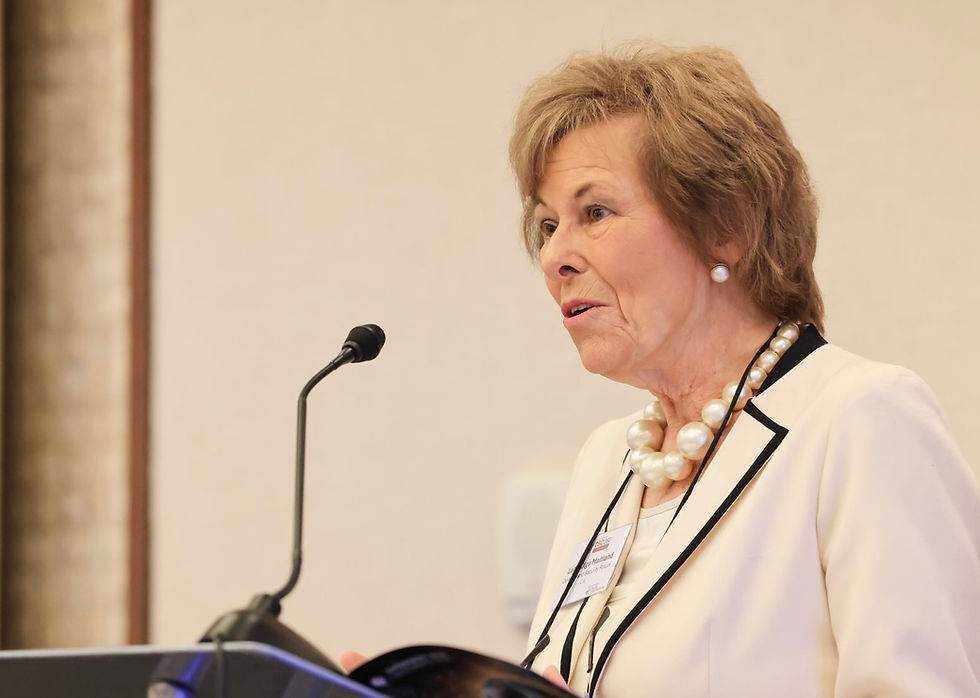Jordan's diplomatic path: Middle East relations and the Trump factor
- noahbergman3
- Sep 19, 2025
- 3 min read
A report by Emily Claessen following a Defence and Security Forum dinner on 30th June 2025, London
Speakers: H.E. Manar Dabbas, Ambassador to the UK for the Kingdom of Jordan, and Lady Olga Maitland
Moderator: Rt. Hon. Sir Malcolm Rifkind, KCMG, KC, former Foreign Secretary and Defence Secretary

In a region beset by instability, Jordan has managed a quiet survival and secured a central role in Middle Eastern diplomacy through consistency, pragmatism, and restraint. Flanked by Syria, Iraq, Israel, and Palestine, Jordan has absorbed waves of refugees, juggled competing pressures from East and West, and navigated existential economic stress – all while maintaining relative calm at home.
Gaza and the Deepening Crisis
Far from eliminating extremism, the current Israeli campaign is deepening it – especially among the younger people. Anger is not confined to the Arab world, and frustration is growing among disaffected youth from all backgrounds in the West.
The conflict in Gaza is producing not fewer militants, but more – 60% of Hamas fighters today are orphans of earlier conflicts. Without political solutions, military victories are temporary, and the region risks birthing more radical iterations of the same threat.
Israel’s Government
The Israeli government is now driven less by national security than by political survival. Settlement expansion, mass displacement, and inflammatory rhetoric are seen as tactics not of strategy but of distraction – each conflict a means of postponing political reckoning.
There is deep worry over developments in Jerusalem, where attacks on both Muslim and Christian holy sites are seen as provocations with explosive potential. As the official custodian of Jerusalem’s holy sites, Jordan views any erosion of the city’s religious heritage as a red line – one that could ignite a much broader crisis.
Palestinian Leadership
The perception is of a leadership adrift – lacking direction, legitimacy, or the means to deliver. While there have been efforts to reform and install new technocratic figures, these have not been met with reciprocal moves by Israel. On the contrary, punitive steps – including withholding tax revenues and accelerating settlement activity – have only made matters worse. The result is a vacuum in Palestinian politics that extremist groups are eager to fill.
No Substitute for a Two-State Solution
Jordan’s position is that the only durable solution is two states. The alternatives – de facto apartheid, permanent occupation, or endless war – are neither morally tenable nor politically sustainable.
Despite regional normalisation efforts such as the Abraham Accords, Jordan sees peace agreements as insufficient without progress on the Palestinian issue. True normalisation requires people-to-people reconciliation – and that cannot happen while Palestinians live under occupation.
Within Israel itself, a climate of political intimidation has emerged, with opposition members silenced and the public increasingly traumatised, shifting from a centre-left to a far-right perspective that views any Palestinian state as a security threat, thereby undermining prospects for meaningful dialogue and reconciliation.
Regional Ripples
In Lebanon, the recent formation of a government is a positive step, but the continued presence of Hezbollah and Israeli incursions in the South risk reigniting conflict. In Syria, the remnants of ISIS remain a serious threat, especially in the east. Jordan supports re-engaging with the Syrian regime. Iran remains a wildcard, and the muted Arab response to recent US strikes on Iranian nuclear sites is telling. Jordan believes that military actions against Iran, without addressing the underlying political issues, risk empowering extremists and creating more regional instability.
Western Engagement
Earlier British governments took a more limited and pragmatic approach. Recent shifts – including the resumption of funding to UNRWA and sanctions on settler organisations – are steps forward, but what Jordan wants from its Western partners is consistent engagement, political honesty, and pressure on all parties to return to a credible peace process. The United States, with its significant geopolitical leverage, remains the key external actor capable of fundamentally reshaping the conflict.
Time is Running Out
Without movement on the political front, demographics and realities on the ground will soon make a two-state solution nearly impossible. The more that settlers expand, the more annexation is normalised and the harder it will be to imagine anything but perpetual conflict. In the meantime, Jordan will continue to play its role: pushing for de-escalation, facilitating dialogue, and insisting that stability is impossible without justice. In a region defined by noise, perhaps Jordan’s greatest strength is its ability to listen, endure, and remind the world of what is at stake.



Comments